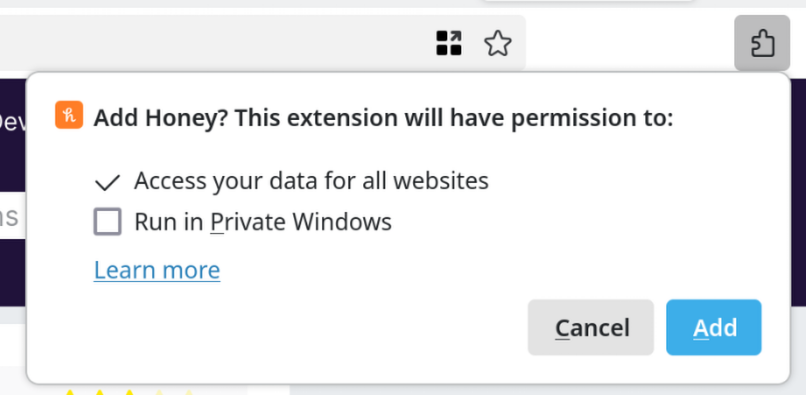“The biggest scam in YouTube history”
Eh. I don’t care about this because it only affects “influencers” who are willing to sacrifice the integrity of their work to advertise products.
Any “content creator” who lost money from this can go get fucked. They can all eat shit for collectively lowering everyone else’s standards and contributing to a ‘new normal.’
Aside from the element of deception towards their sponsored creators, I wonder if this will set president for what is a relatively common practice.
https://sirlinksalot.co/affiliate-hijacking/
Honey isn’t the only one doing this. Brave Browser does it too:
Does it did? It’s not clear from the link at first glance.
What, sorry? I think you have a typo.
This one is now opt in with very ambiguous language and doesn’t tell you what is doing. I like suggested search results and might check that if I didn’t know better.
https://brave.com/blog/referral-codes-in-suggested-sites/
They have a habit of doing pretty terrible scammy practices, funnily their bugs all seem to make them money:
https://www.reddit.com/r/privacy/comments/191yu33/why_is_brave_highly_disliked_in_the_privacy/
So do you. “Precedent”
I’m curious as to whether the industry will start moving from last-touch attribution to first-touch (or multi-touch) attribution instead.
The only reason last-touch (last affiliate link gets all the credit) is commonplace now is because it’s easy to implement. No need for long-term tracking. What the industry really wants is either first-touch (first affiliate link or ad you click gets the credit) or multi-touch (the payment is split between every affiliate), depending on who you ask.
Hell yeah. Huge respect to him and the other youtuber that exposed this, it’s crazy that Honey just pocketing most of the referral money has been undiscovered for so many years.
I can see how it happens though.
No one was doing any oversight on their practices. If you were running a referral affiliate link system, it must have seemed like honey was doing a really good job bringing customers to you.
I’m just kind of disappointed that nobody inside the company ever spoke up or blew any whistles and said “Hey, this is at best unethical if not entirely illegal and either way exposes us to the risk of a massive lawsuit, maybe we should just actually do our jobs instead of stealing the work of other people.”
I dunno man, whistleblowers aren’t getting good treatment from what I see. Two got “suicided” last year from Boeing and OpenAI. The two Theranos whistleblowers were treated really poorly. I felt so bad for them. They’re doing talks on ethics and stuff and I only wish them the best. They stood their ground on what they believed in.
Did you think Amazon didn’t know how Honey operates?
I think Amazon didn’t care, so even if someone inside the company figured it out Amazon was just like, it’s not our problem to deal with.
I’m not. What do you get as a reward for blowing the whistle? Genuinely?
-
There’s no bounty, even if there was you wouldn’t get it for at least a year after you blow the whistle.
-
Once it’s discovered it’s you, you’re fired. There goes your paycheck, your health insurance. Now your home is in jeopardy and you have no decent income verification to get a new one.
-
Good luck working in any job even remotely related to what you know. You now have a stigma in any background check and while a privately owned mom & pop might look at you favorably, there ain’t a single corporation who will take pride in hiring you. You’re risky.
The most ethical person, is one with no debt, who owns their home, and has 8 months expenses saved up. That’s not most Americans right now.
This is also why there was such coordinated effort to shut down wikileaks, or to at least stall out the cultural movement that was building behind it.
If you give people a methodology to whistleblow that at least on paper allows them to stay anonymous and avoid putting their life/livelyhood/survival in jeapordy, that removes one of the biggest disincentives.
-
There is a YouTube video that literaly said they were scamming from 2020.
Linus tech tips figure it out a year back and stop shilling it once they figured it out but for some reason didn’t make a video about it?
but for some reason didn’t make a video about it?
Neither did every other creator who stopped doing paid promotion for Honey years ago.
They’re not scambusters, they’re a computer/tech review channel.
They didn’t make a video about it because they thought it was a problem for creators, not a problem for consumers. They may have communicated to creators separately to drop honey. They talked about it publicly once they found out honey was also lying to consumers about what they did.
It was Megalag and his channel is amazing. The colorblind scam glasses investigation was amazing
I don’t get how anyone thought they would work. If your color blind they obviously don’t magically alter the receptors in your eyes.
If they had worked they might have done so by some sort of contrast enhancement or edge detection, but I don’t think either are possible with just optics
Yes you could absolutely do it with a camera and a computer screen and some software but I can’t see how glass or plastic lenses could possibly be expected to do it
I just watched the megalag videos on the glasses — the first episode of three — and the claim is they cut out confusing areas of colour that abnormal chromats see.
So if it worked, it only works for people with abnormal versions of one of the three normal colour vision sensors, and only if their deficiency is in green, and then only if it’s the correct degree of deficient
But it doesn’t work anyway.
The glasses help people see the number in some sheets in the colourblindness test, but hide the number in others. Their colour blindness would appear slightly worse than reality.
Colourblindness knows many types, most can still see color. Some types even see more or shifted colors.
At least on paper it seems plausible to measure the colour detection cones per iris and then build a filter to strengthen color per eye for which detection is lacking.
The moment i realized they sold them without detailed personal eye scanning involved i knew they were a scam. Gimmick at best. Worst part is they seem catered to people as gifts for colorblind friends, thats just a way to obstruct people from analyzing them to much. What are they going to say? “I dont for a sec believe this overly saturated view is realistic and your gift sucks”? No, they will say “wauw thank you” and shove it in a drawer somewhere next day, never to mention them again.
If selling false hope wasn’t profitable, there would be a lot of companies (and religions) go out of business.
I’m struggling to understand how everyone thought Honey made money. I have assumed from the first time I saw an ad for them that this is how they operate. It’s not like it’s difficult to prove or disprove either.
I’m so, so sick of these comments every time some shady shit is uncovered. “How could no one else see this, you’re all so stupid, I knew from the very first ad!”
Yes yes, you’re mommy’s special little genius, despite conspicuously absent comments from that time…
Loads of people are suspicious of coupon schemes. They look dodgy. It’s no wonder that people come along after one of these schemes turns out to actually be a scam to say “see, I knew these things were bad” with the only evidence being that they never subscribed to it
Their fault is they claim it was this one specifically
This really does fall under two umbrella cautions. There’s no such thing as a free lunch, and how are they making money? Suspicion was warranted from day one, especially if it was owned by PayPal.
Now, there are a lot of smart people on the internet who could have tracked all those messages and figured it out, like ultimately happened. I just wish they’d done it sooner.
It wasn’t “uncovered” though. This is their business model. I’ve told every person I know using Honey for years that it’s a shady extension and they should stop using it. Unfortunately I don’t have a huge following to offset Honey’s massive ad spend.
I’m not calling anyone stupid, but stop treating this like it’s new information. Your browser warned you this might happen when you installed the extension:

Lol, “access your data” is a little different from “overwrite cookies, now sending all promised creator revenue to Honey”. Also, it found discounts, but stores had full control over over how much, and even if it didn’t give you a discount, it still claimed all referral revenue… Don’t act like that was all obvious, intuitive, and known by you, it wasn’t.
I’m not claiming that it was “intuitive”, just that the browser did tell the user exactly what the add-on was allowed to do. Sure, Chrome and Firefox deserve some blame for not making the warning more explicit/dire, but they did make an attempt. Overwriting cookies and rewriting affiliate links are subsets of “access your data”.
Also, I’m not claiming that I knew exactly what Honey was doing, just that I suspected it was shady and recommended no one use it.
If I remember correctly influencers went out of their way to promise Honey was not doing anything sketchy like selling your data and said they got a small commission from the seller free of charge. Turns out Honey stole others commissions.
I just assumed they operated by collecting and selling user data. So while I knew the business model was unethical, I didn’t expect them to get more creative!
That would arguably be even worst.
Let’s not pretend they’re not doing that as well.
I thought they made it from selling user data.
Tbf its not a given they don’t also do this.
Same. I thought they sold your browsing and purchase history.
One upon a time, websites had actually useful coupons and RetailMeNot was created by the people who made BugMeNot and it was great, but more and more websites caught on and RetailMeNot was bought out to the tune of $300 million.
Then everything went to shit.
The fact that BugMeNot and RetailMeNot grew so huge is interesting. They were created by two Australians, and for a while were only popular in Australia.
Will Barry B. Benson bee involved?
Can someone ELI5 what honey was actually doing?
Lying and stealing
Who did they steal from? How did they steal? I never used them but didn’t they provide coupon codes or smth?
They stole referrals. I’ll explain like you’re 10, it’s a bit much for a 5 year old.
Let’s say you watch a video with a link to a product in the description. Normally, when you click that link, a referral code is embedded so the person who made the video gets a referral fee when you make a purchase.
Honey would remove those referral codes and replace it with their own.
like you’re 10
Then uses embedded and referral. Not sure I know many ten year olds that would get those meanings. 😊
I’m sorry that you have so little faith in the 10 year olds you know.
Does your comment have a constructive point or are you simply the sort that looks for technicalities to correct so they might feel smugly satisfied about themselves?
Erm… not at all. Feel free to peruse my comment history if you want.
I didn’t mean anything by it and I was merely thinking out loud. I added the smiley to show I was friendly and meant no offence.
I realise now that the smiley could be confused for smugness, but honestly was just a thought I typed out.
You have a great weekend and I will try and be better.
I’m very sorry. I interpreted your comment entirely incorrectly and my response was snappish and rude. I ought to have given you the benefit of the doubt, but instead lashed out. Many apologies, I’ll do better!
Everyone else is only talking about the scummy affiliate revenue stealing, but that’s been public info for a while.
The more alarming stuff is that they partner with businesses to manage the coupon codes shown on Honey. If a business doesn’t want consumers to have discounts below a certain percentage, they can remove those coupons from Honey. This means that Honey no longer does the thing that it’s advertised to do, and they’re getting paid affiliate revenue after lying to consumers.
That was my assumption all along IMO. Any time a coupon company gets big, it’ll end up becoming an advertising platform, because there’s a lot more money in that than saving people money, especially if you make people think they’re saving money.
That’s why I don’t use Honey or any other coupon service, unless I’m actually about to buy something specific and looking for a discount (e.g. I’m happy with the price, but I’d be happier with a 10% discount).
They’d replace affiliate link cookies with their own. So if you’re watching a makeup tutorial and you use their referral code but then use Honey to look for deals, Honey takes the commission instead of the person actually doing the work.
It’s like if the finance person at a car lot decided to take everyone’s commissions because they touched the paperwork last.
They’d replace affiliate link cookies with their own
Practically every coupon site does this too though, as do other coupon extensions.
Here’s the best way I’ve seen it illustrated:
Imagine walking into a physical retail store, something like Best Buy. You want to buy a TV. A blue shit salesman talks to you for awhile, helping you pick out the TV you want with the features you like. He says “Okay, so take this slip to the register, pay for it there and they’ll bring out the TV to your car.” The slip has the salesman’s name on it so he gets a commission on the sale.
On your way to the register, a slimy guy in a suit says “Hey let me see that sales ticket, maybe I’ve got a coupon for that TV, save you some money.” So you hand him the sales slip, he says “Yeah, here’s one for $2 off on this $900 television.” And he hands you that coupon plus a sales ticket…not the original one, another one with HIS name on it instead of the salesman. The slimy guy in the suit is stealing the salesman’s commission.
Now imagine doing this with software on the internet and you’ve got a class action lawsuit from Legal Eagle.
The reason so many people are mad is sometimes the suit guy even comes back saying, sorry man didn’t find a discount, but here is your slip. Meanwhile he has changed the slip and added his name and would get the commission without doing anything.
I think the folks suing are going to be the ones whose commissions were stolen. I’m kinda hoping someone gets their head sewn to the carpet over this, it’s a very business major thing to have done.
I’m sure, I was pointing out why even as a customer you should be mad
My problem here, and I don’t mean to victim blame but I don’t understand why anybody thought Honey had a business model that was trustworthy. Most people would see through the slimy guy in your example, so why would they install a slimy guy in their browser? Why would people take sponsorship from a slimy guy? Why would they read our copy that tells kids to “install it on every computer in the house”?
Nobody asked themselves “How does Honey make money out of this?” because at the very least they were going to be data scraping! That much was obvious.
It’s simple, Honey connects you with coupons, which drives you to store B instead of store A, and Honey makes a commission. If you follow a different affiliate link, and Honey gives you a coupon, they should share the commission with the affiliate.
That’s how it should work. But instead, Honey just hijacks the commission.
That’s still a shitty exploitative business model. A bit less deceptive, but that original coupon vendor is still having affiliate revenue stolen from them.
That’s one way to look at it, but another is that more people would use the coupon, so the original coupon vendor makes up for lower margins with higher volume.
Honey’s take should be small, since they’re doing very little of the work.
I don’t understand how you think the smaller coupon gets more volume. It gets no volume as the hypothetically “good honey” redirects everyone away from it.












